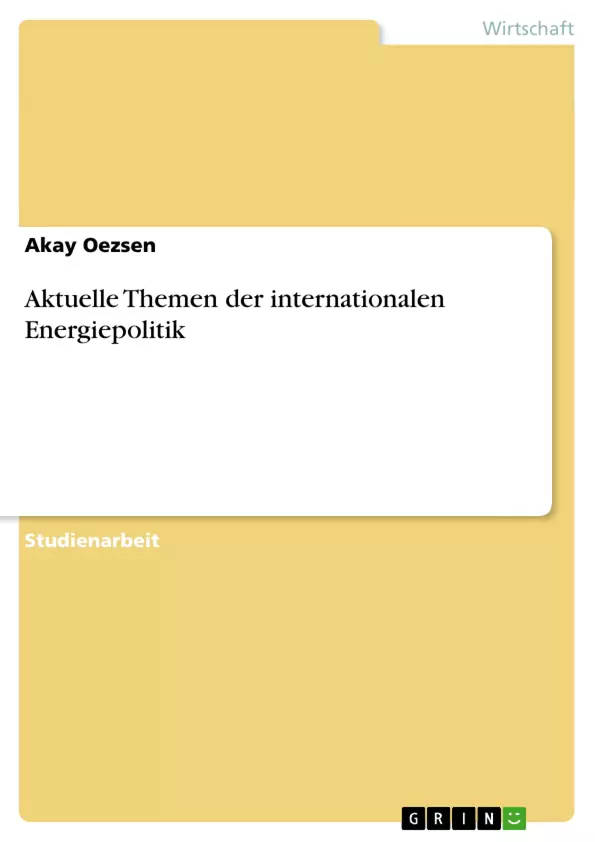Die Hausarbeit behandelt 8 aktuelle Themen zur internationalen Energiepolitik. Diese Themen sind folgende:
1.1 What is your (or your family’s) energy and CO2 footprint? What policies or actions
do you suggest to improve your own energy or CO2 footprint? How much more are you
willing to pay?
1.2 What have been the macroeconomic effects of the recent oil price increases? In
Germany? In net oil exporting and net oil importing countries? Why has the effect been less
destabilizing than in the past?
1.3 Energy Policy attempts to meet the triple objectives of energy security, economic
competitiveness and environmental sustainability. Why is it so difficult to achieve?
1.4 What is the price elasticity of demand for oil as presented in the literature. How do
you explain the differences over time and by country?
1.5 What does the peak oil theory state? Why do critics not agree and what approach
should policy makers take?
Teil 2:
2.4 What is the contribution of renewable energy to transport, electricity and heating
world wide, in Europe and in Germany?
2.5 What policies are supporting the developement of renewable energies in Germany?
How much is being spent per year?
2.6 What policies are being proposed in Europe to liberalize the electricity market?
Inhaltsverzeichnis
- Teil 1
- 1.1 What is your (or your family's) energy and CO2 footprint? What policies or actions do you suggest to improve your own energy or CO2 footprint? How much more are you willing to pay?
- 1.2 What have been the macroeconomic effects of the recent oil price increases? In Germany? In net oil exporting and net oil importing countries? Why has the effect been less destabilizing than in the past?
- 1.3 Energy Policy attempts to meet the triple objectives of energy security, economic competitiveness and environmental sustainability. Why is it so difficult to achieve?
- 1.4 What is the price elasticity of demand for oil as presented in the literature. How do you explain the differences over time and by country?
- 1.5 What does the peak oil theory state? Why do critics not agree and what approach should policy makers take?
- Teil 2
- 2.4 What is the contribution of renewable energy to transport, electricity and heating world wide, in Europe and in Germany?
- 2.5 What policies are supporting the development of renewable energies in Germany? How much is being spent per year?
- 2.6 What policies are being proposed in Europe to liberalize the electricity market?
Zielsetzung und Themenschwerpunkte
Die Hausarbeit befasst sich mit aktuellen Themen der internationalen Energiepolitik. Sie untersucht die Auswirkungen von steigenden Ölpreisen auf die deutsche und internationale Wirtschaft, beleuchtet die Herausforderungen der Energiepolitik und analysiert die Entwicklung von erneuerbaren Energien in Deutschland und Europa.
- Der persönliche und gesellschaftliche CO2-Fußabdruck sowie Maßnahmen zur Reduzierung.
- Die makroökonomischen Auswirkungen von Ölpreissteigerungen.
- Die Herausforderungen der Energiepolitik im Spannungsfeld zwischen Energiesicherheit, wirtschaftlicher Wettbewerbsfähigkeit und Umweltschutz.
- Die Entwicklung von erneuerbaren Energien in Deutschland und Europa.
- Politische Maßnahmen zur Förderung erneuerbarer Energien und zur Liberalisierung des Strommarktes.
Zusammenfassung der Kapitel
Teil 1
- Kapitel 1.1 analysiert den persönlichen CO2-Fußabdruck und diskutiert Maßnahmen zur Reduzierung des eigenen Energieverbrauchs.
- Kapitel 1.2 untersucht die makroökonomischen Auswirkungen von steigenden Ölpreisen auf verschiedene Ländergruppen.
- Kapitel 1.3 erörtert die Herausforderungen der Energiepolitik im Hinblick auf die drei Ziele Energiesicherheit, wirtschaftliche Wettbewerbsfähigkeit und Umweltschutz.
- Kapitel 1.4 betrachtet die Preiselastizität der Ölnachfrage und erklärt Unterschiede über Zeit und Länder hinweg.
- Kapitel 1.5 behandelt die Peak-Oil-Theorie, diskutiert Kritik und betrachtet politische Handlungsmöglichkeiten.
Teil 2
- Kapitel 2.4 untersucht den Beitrag erneuerbarer Energien im Bereich Transport, Strom und Wärme auf globaler, europäischer und deutscher Ebene.
- Kapitel 2.5 analysiert politische Maßnahmen zur Förderung erneuerbarer Energien in Deutschland und deren Finanzierung.
- Kapitel 2.6 betrachtet die vorgeschlagenen Politiken zur Liberalisierung des Strommarktes in Europa.
Schlüsselwörter
Internationale Energiepolitik, Ölpreis, CO2-Fußabdruck, erneuerbare Energien, Energiesicherheit, wirtschaftliche Wettbewerbsfähigkeit, Umweltschutz, Peak-Oil-Theorie, Strommarktliberalisierung.
Frequently Asked Questions
What are the triple objectives of energy policy?
Energy policy attempts to balance three main goals: energy security, economic competitiveness, and environmental sustainability.
What does the Peak Oil theory state?
Peak Oil theory suggests that there is a point in time when the maximum rate of global petroleum extraction is reached, after which production will decline.
How do oil price increases affect the economy?
Rising oil prices have macroeconomic effects that differ between net oil exporting and net oil importing countries, impacting inflation and growth rates.
What is the role of renewable energy in Germany?
Germany has specific policies to support the development of renewable energies in transport, electricity, and heating to reduce CO2 footprints.
What is being done to liberalize the European electricity market?
Various policies are proposed in Europe to increase competition and efficiency by liberalizing the electricity markets across member states.
- Arbeit zitieren
- Akay Oezsen (Autor:in), 2007, Aktuelle Themen der internationalen Energiepolitik, München, GRIN Verlag, https://www.grin.com/document/83940



